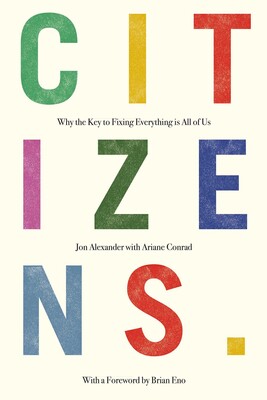Nowadays, it’s easy to get caught in a downward spiral of pessimism.
An immense amount of effort is dedicated to solving complex global issues, but it never seems to be enough. And the media often adds fuel to the fire, telling us that our efforts are futile.
Citizens by Jon Alexander counters that, and offers a refreshing glimpse of hope. After spending the first decade of his career working in advertising, Alexander grew tired of what he called the Consumer Story, “the telling — retelling, and retelling, thousands of times a day — of a story about who we are and what we’re capable of.” This is a story that saw the solution to the world’s problems as buying stuff, more stuff, and better stuff. A story that claimed pursuing self-interest would contribute to collective interest.
Alexander explains that the Consumer Story made us believe that picking from a set of choices meant we had power, whereas in reality most people were excluded from the process that generated those choices.
This idea, that the greatest contribution we can make to our communities as individuals, is to keep spending and consuming is, in Alexander’s opinion, outdated.
There was a time when this approach made sense — when the Subject Story was the dominant narrative and change was needed. In the Subject Story people were the subjects of the God-chosen king, who gave his subjects protection and security because humans were ‘infant-like and guileless.’ Later on, when the Consumer Story emerged, it was a breath of fresh air. Now people had power. They weren’t as hopeless and they could vote and buy. They had choice.
A need for a Citizen society

As the Consumer Story served its purpose, a need for a more satisfying narrative emerged. This is where Alexander shines the light to a much more hopeful trend that he sees emerging all over the world: the Citizen Story. Where the Consumer Story assumes humans are lazy and selfish and can only be ‘driven to act by the competitive behaviour,’ the Citizen Story believes that humans are creative, and that they care about their communities and want to contribute positively to their society.
Consequently, Citizen organisations put participation, transparency and openness in the core of their operation. They ‘trust and believe in people, rather than asking them first to trust and believe in them.’ That means involving people and communities in all stages of the decision-making process, and allowing everyone to participate and have ownership. In a business context, this means having a clear purpose, creating opportunities for people to participate in your purpose in joyful ways and figuring out step-by-step how to build the business around this new way of working.
I admit, I was quite sceptical when I began reading the book. I couldn’t wrap my head around the core belief that humans aren’t greedy, selfish and destructive — given our history. And the kind of change Alexander is talking about would be incredibly difficult to pull off, if not impossible.
But throughout the book, he gives examples… from individuals and organisations to governments and companies, of how the Citizen Story is being adopted around the world. He retells the course of human history through the lens of these Stories, and shows us that change on this scale is possible, and has already been done once. He also points out that, in the Consumer Story, power is more widely distributed compared to the Subject Story — which means that there’s a larger opportunity to shift power.
Guiding businesses into becoming Citizen organisations
In 2014, Alexander co-founded the New Citizenship Project, to help companies and organisations transition into Citizen organisations. His team put together a list of things to do to make the Citizen way of thinking more accessible to businesses, organisations and individuals. Here are the New Citizenship Project’s Seven Modes of Everyday Participation:
- Tell stories — Let customers speak for your business.
- Gather data — Think about how your business can get people to collect data that’s crucial for research, instead of treating them like guinea pigs.
- Share connections — Think about how your business can encourage people to share your company’s purpose with their friends and family, instead of them just passively buying products.
- Give time — Customers know your product best. Think about how you can use their experience and enable them to work with your business.
- Learn skills — Think about how your business can train customers to participate in the company’s purpose.
- Crowdfund — Allow people to buy into the company, not just buy from it.
Featured image: Ayo Ogunseinde / Unsplash

































